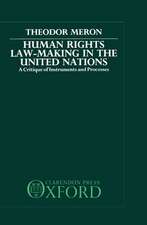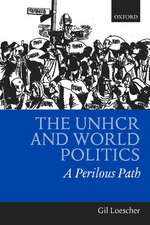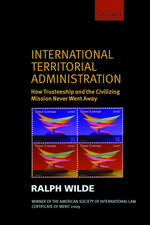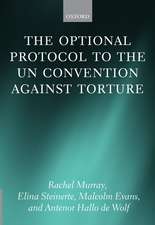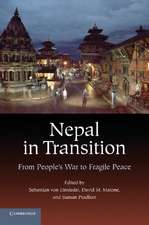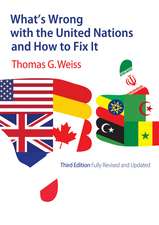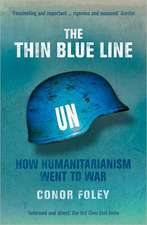The United Nations and the Politics of Selective Humanitarian Intervention
Autor Martin Binderen Limba Engleză Hardback – 4 ian 2017
| Toate formatele și edițiile | Preț | Express |
|---|---|---|
| Paperback (1) | 695.19 lei 6-8 săpt. | |
| Springer International Publishing – 7 iul 2018 | 695.19 lei 6-8 săpt. | |
| Hardback (1) | 699.77 lei 6-8 săpt. | |
| Springer International Publishing – 4 ian 2017 | 699.77 lei 6-8 săpt. |
Preț: 699.77 lei
Preț vechi: 823.26 lei
-15% Nou
Puncte Express: 1050
Preț estimativ în valută:
133.89€ • 139.81$ • 110.57£
133.89€ • 139.81$ • 110.57£
Carte tipărită la comandă
Livrare economică 15-29 aprilie
Preluare comenzi: 021 569.72.76
Specificații
ISBN-13: 9783319423531
ISBN-10: 3319423533
Pagini: 306
Ilustrații: XIII, 297 p. 2 illus. in color.
Dimensiuni: 148 x 210 x 23 mm
Greutate: 0.5 kg
Ediția:1st ed. 2017
Editura: Springer International Publishing
Colecția Palgrave Macmillan
Locul publicării:Cham, Switzerland
ISBN-10: 3319423533
Pagini: 306
Ilustrații: XIII, 297 p. 2 illus. in color.
Dimensiuni: 148 x 210 x 23 mm
Greutate: 0.5 kg
Ediția:1st ed. 2017
Editura: Springer International Publishing
Colecția Palgrave Macmillan
Locul publicării:Cham, Switzerland
Cuprins
Introduction.- Chapter 1. UN Security Council intervention in humanitarian crises: A framework for explanation.- Chapter 2. Paths to intervention: A fuzzy-set analysis.- Chapter 3. The Security Council and the war in Bosnia.- Chapter 4. The Security Council and the crisis in Darfur.- Chapter 5. The most recent cases: Côte d’Ivoire, Libya, Syria.- Conclusion.-
Notă biografică
Martin Binder is Associate Professor in International Relations at the University of Reading. He previously held a position at the WZB Berlin Social Science Center and was a visiting scholar at the Center for European Studies at Harvard University. His research has been published in the Journal of Peace Research, International Studies Quarterly and International Theory, and in other journals.
Textul de pe ultima copertă
This book offers the first book-length explanation of the UN’s politics of selective humanitarian intervention. Over the past 20 years the United Nations has imposed economic sanctions, deployed peacekeeping operations, and even conducted or authorized military intervention in Somalia, Bosnia, or Libya. Yet no such measures were taken in other similar cases such as Colombia, Myanmar, Darfur—or more recently—Syria. What factors account for the UN’s selective response to humanitarian crises and what are the mechanism that drive—or block—UN intervention decisions? By combining fuzzy-set analysis of the UN’s response to more than 30 humanitarian crises with in depth-case study analysis of UN (in)action in Bosnia and Darfur, as well as in the most recent crises in Côte d’Ivoire, Libya and Syria, this volume seeks to answer these questions.
Caracteristici
Addresses central debates in international relations and international regulation Investigates the global intervention decisions of the UN Security Council Offers empirical research on humanitarian intervention by giving empirical attention to the causes of humanitarian intervention



